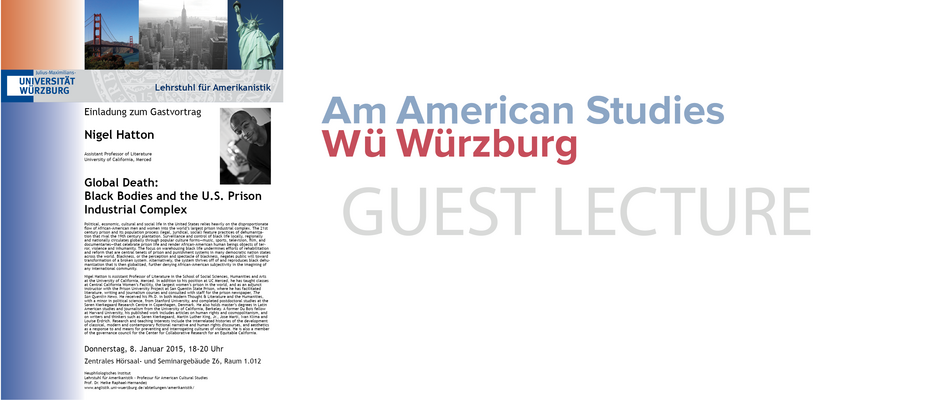Nigel Hatton: "Global Death: Black Bodies and the U.S. Prison Industrial Complex"
09.12.2014Gastvortrag am Donnerstag, 8. Januar 2015, 18-20 Uhr im Zentralen Hörsaal- und Seminargebäude Z6, Raum 1.012
Political, economic, cultural and social life in the United States relies heavily on the disproportionate flow of African-American men and women into the world’s largest prison industrial complex. The 21st century prison and its population process (legal, juridical, social) feature practices of dehumanization that rival the 19th century plantation. Surveillance and control of black life locally, regionally and nationally circulates globally through popular culture forms—music, sports, television, film, and documentaries—that celebrate prison life and render African-American human beings objects of terror, violence and inhumanity. The focus on warehousing black life undermines efforts of rehabilitation and reform that are central tenets of prison and punishment systems in many democratic nation states across the world. Blackness, or the perception and spectacle of blackness, negates public will toward transformation of a broken system. Alternatively, the system thrives off of and reproduces black dehumanization that is then globalized, further denying African-American subjectivity in the imagining of any international community.
Nigel Hatton is Assistant Professor of Literature in the School of Social Sciences, Humanities and Arts at the University of California, Merced. In addition to his position at UC Merced, he has taught classes at Central California Women’s Facility, the largest women’s prison in the world, and as an adjunct instructor with the Prison University Project at San Quentin State Prison, where he has facilitated literature, writing and journalism courses and consulted with staff for the prison newspaper, The San Quentin News. He received his Ph.D. in both Modern Thought & Literature and the Humanities, with a minor in political science, from Stanford University, and completed postdoctoral studies at the Søren Kierkegaard Research Centre in Copenhagen, Denmark. He also holds master’s degrees in Latin American studies and journalism from the University of California, Berkeley. A former Du Bois fellow at Harvard University, his published work includes articles on human rights and cosmopolitanism, and on writers and thinkers such as Søren Kierkegaard, Martin Luther King, Jr., Jose Martí, Ivan Klíma and Louise Erdrich. Research and teaching interests include the interrelated histories of the development of classical, modern and contemporary fictional narrative and human rights discourses, and aesthetics as a response to and means for preventing and interrogating cultures of violence. He is also a member of the governance council for the Center for Collaborative Research for an Equitable California.
Neuphilologisches Institut
Lehrstuhl für Amerikanistik - Professur für American Cultural Studies
Prof. Dr. Heike Raphael-Hernandez



